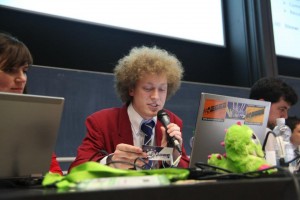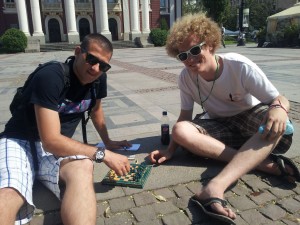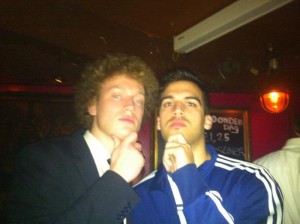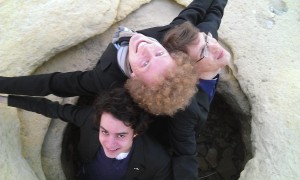Paul Smits (AEGEE-Enschede) is one of the three candidates running for president of AEGEE-Europe. He has gained a lot of experience as a local board member, as subcommissioner and, especially, during the past year and a half as a member of the Chair Team. His candidature came for many as a surprise, with his current term as Chairperson of the Agora and the EBM still ongoing. This, and many more questions, were asked by The AEGEEan.
The AEGEEan: First of all, I must start with a question that many AEGEE members themselves have been asking – why did you decide to run for president while your term as Chairperson was still ongoing?
Paul: It was a difficult decision I took this year to possibly let my tasks and responsibility as Chairperson go. In October, going for the Comité Directeur was already on my mind, but it was not a concrete idea yet and I really felt that for the time being I should do something that suits me and can be combined with my studies. I was and I am still motivated to work on statutory events and, as Chairperson, I could improve myself a bit more, while already seeing all aspects of AEGEE.
Still, I realised that if I wanted to spend a wonderful year in Brussels working for our organisation, it would have to be this year, because otherwise I would start with clinical internships, which would not allow me to be as focused on AEGEE as I am now. Now is the time that I feel I am ready and I can put my passion into practice. So yes, I am unlucky that the terms for Chair and Comité Directeur are as they are, but I had to take the decision now, if I ever was to make it.
Luckily, I am working with a very capable and experienced Vice-Chairperson at the moment, and I am sure Alberto (Cuesta Noriega, ed.) can handle the last Agora of his term without me on stage. I can stay in the team for some time after Agora Patra, making sure there will be a smooth transition and it will not be hard for the partly new Chair Team to work on an unforgettable Agora in Cagliari. Of course I will always be there to support them in any way.
 The AEGEEan: What are the biggest lessons you have learnt during your time at the Chair Team?
The AEGEEan: What are the biggest lessons you have learnt during your time at the Chair Team?
Paul: As a member of the Chair Team we are cooperating with many bodies and people, which have been changing for each event we worked on. Also the composition of the team itself was different for almost each statutory event. Working with so many different people, mostly by distance, taught me a great deal about intercultural cooperation and communication.
As Chair Team, we strive to facilitate collective decisions in a balanced, informed and structured way, while leaving room for creativity. It’s important to be aware of how we make decisions and why, so we can reflect on them. This is also something I think is very important for the work of the Comité Directeur and the CD has a responsibility in making sure that other bodies also work based on conscious choices.
The AEGEEan: I imagine that building a strong team will be a priority. But what about you – do you consider yourself as a teamplayer?
Paul: I do consider myself as a teamplayer for sure. I love working in teams because strong minds cannot produce the great things they are capable of, if they are not interconnected. I know that in a team I listen carefully to other team members and try to include everyone’s input. I am flexible in how I work and I can adjust my style to whatever is needed by my colleagues. I look forward to working in a team full of motivated people, where everyone brings ideas and concerns to the table and where we can take ownership of our goals together.
 The AEGEEan: And how do you plan to ensure that there is a good teambuilding?
The AEGEEan: And how do you plan to ensure that there is a good teambuilding?
Paul: We will have to start working on this soon after the elections. Living and working together in the house is one of the major challenges we will face. It is important that we get to know each other well. With the right approach and some effort from everyone we will become both friends and good colleagues. I think we should consider a professional teambuilding coach to give us a kick-start, and then we can work on a common vision and have some great plans ready by the beginning of our term. The year is short and time goes fast.
During the year we need an open approach to each other at all times, have frequent personal evaluations and above all, have fun together. I’m in for doing things together with the other CD members besides working for AEGEE, while taking into account the personal space the team members need. The best ideas are born when you are feeling good.
The AEGEEan: One of our readers wants to ask you, how would you briefly (in a phrase) describe the current situation of AEGEE, regarding internal structures and activities?
Paul: This entirely depends on to whom I am to describe the situation and with which intentions. Let’s go with “AEGEE is diverse with different kinds of people from different parts of Europe, and its activities are as diverse as its members are.”
The AEGEEan: Is AEGEE really working well enough at all levels in your opinion?
Paul: AEGEE is already pretty awesome, but keeping such a huge organisation going will always be a struggle. This is not bad at all, because we offer opportunities to so many people to work on it and learn from it. It is working well enough, AEGEE seems sustainable and able to deliver. We shape Europeans and we can be proud of what we do.
The AEGEEan: You talk about the idea of strengthening the network with a “bottom-up approach”. We always talk about this gap existing between the local and the European levels – do you have any ideas how to bridge it?
Paul: The solution for this cannot only come from the small group active in European level bodies. For bridging a gap, both sides should be working on the bridge, before they can connect in the middle. Of course we can stimulate locals to get close with what is going on on the European level, but this has to be done in a way that we don’t try to make them follow our lead or impose anything. We should always keep in mind what locals need and how we can facilitate them in their needs.
Of course our members are not all activists, still we should take them seriously and listen to them. A properly working Network Commission is indispensable for the connection between locals and European level bodies. Ideally all local boards take the responsibility to connect and inform, we only have to make them want that.
The AEGEEan: And how do you plan to involve “more directly” the network in the policy making processes?
Paul: Europe is not governed in Brussels, decisions are not made in Brussels. They are made throughout our continent and if we want to be an important actor in fighting for the needs of students and young people, we should be involved everywhere. AEGEE has a great advantage of being present in student cities in 40 countries and we can and should use that potential. Not only for reaching other students and young people, but as we are empowering them, we can enlarge our sphere of influence and shape the Europe we want, on all levels. The current CD has already been involving more people in policy making and representation and they have initiated AEGEE’s formal policy strategy. I think that it is good to define how we are doing things and we can include locals even more in conveying our message. We should also look for ways for more structured, yet informal discussions. After AEGEE-L and the online forum were abandoned, we need a proper platform for online discussion so that all AEGEEans can be involved and bring up topics they care about. Improving our democratic structure will not be easy, and it might require some major reforms or investments in e.g. our information technology infrastructure.
The AEGEEan: Does that mean that you also plan a bigger involvement of locals in the National Youth Council? You have also been very involved in the Dutch Youth Council.
Paul: I definitely believe national youth councils can offer us much. I’m really enjoying representing AEGEE towards the Dutch Youth Council and our locals here are already benefitting from our membership. It would be nice to have this in every country AEGEE locals are present and to structure the way we influence them. It would be amazing if we can use our network to get all of the youth of Europe on the same page, united working for the goals we strive for. However, we should also evaluate whether our influence is really substantial and worth the trouble every once in a while.
 The AEGEEan: What would you do differently than your predecesor, Luis Alvarado Martínez?
The AEGEEan: What would you do differently than your predecesor, Luis Alvarado Martínez?
Paul: I think Luis is a great example and has meant a great deal for AEGEE together with the rest of the current CD. I know that I would probably have a different leadership style, but it is hard to judge his internal leadership from the outside. Although I acknowledge the importance of our external relations and the amazing work Luis has done in this field, I would probably have a more internal focus, while keeping an eye on external possibilities, so we can link our internal organisation with the outside world.
The AEGEEan: Another reader from The AEGEEan asks – “Paul, my compliments on a very good candidature, but there is one small thing which might dissuade me to vote for you. In the past, you had some actions and statements which one might not consider to be very professional. Do you think you are diplomatic enough to take up the helm as president?”
Paul: Sure there are things that I had to work on. For instance it happened that with no bad intentions my sense of humour was interpreted in a way I did not expect it, causing people to feel offended, which I have never wanted. I actually have a natural tendency to be avoiding conflict, and I always try to handle misunderstandings with the people involved as soon as any friction comes to my attention.
After one and a half year of being neutral and impartial in the Chair Team, and after working a lot with different external partners on all levels, I learned a lot about communication and how to act in different circumstances. I am sure acting and talking diplomatically will not be a problem.
The AEGEEan: Which are the three things in AEGEE you would like not to change, if elected?
Paul: I would never change our openness and inclusiveness. Even though we want to focus on topics and be professional, we are also a means for bringing people together and a platform for development. Like I said in my candidature, “having fun with friends, discussing whatever comes to your mind, which leads to new ideas, resulting in passionate activists working on strong thematic topics. That should always remain our strength and be facilitated wherever possible.”
Furthermore I would like to stress that we should not be afraid of changing. Since AEGEE is a students’ organisation we are always changing, sometimes in a cyclic way. As long as we take a good look at why things are as they are, change is usually good!
The AEGEEan: What will happen with the Chair Team if you get elected? And if you don’t, would you plan to continue?
Paul: The chair team will have to look for a new team member if I get elected. As I said before, I am convinced it will be fine and they will find someone motivated and capable to bring the team back to full strength. If I don’t get elected, I would be happy to continue my work as Chairperson and finish my term with my wonderful team.
 The AEGEEan: Both Réka Salamon (AEGEE-Aachen) and Léa Charlet (AEGEE-Paris) did the presidential internship and you came up more as a “surprise”. Why was it so last-minute? And what do you think of your fellow candidates?
The AEGEEan: Both Réka Salamon (AEGEE-Aachen) and Léa Charlet (AEGEE-Paris) did the presidential internship and you came up more as a “surprise”. Why was it so last-minute? And what do you think of your fellow candidates?
Paul: The presidential internship was initiated this year, as one of the actions working towards the main aim of the current CD in this term, being continuity. I love the work the current CD did in this field, since, as we all know, continuity is a considerable challenge in students organisations. It’s a great opportunity, although I had my concerns about the presidential internship because it puts pressure on the candidates, taking away some flexibility and inclusiveness, and in the current form it favours president candidates over other CD candidates, where I think all candidates should have the opportunity to get to know the work of the CD and AEGEE-Europe from up-close. Still I would have loved going to Brussels for a while to try the CD life and prepare myself, but unfortunately I could not afford leaving Enschede that long. Spending a year in Brussels, leaving everything here behind is already a huge decision, especially because it has little direct added value for my studies. Therefore I had to make sure that I will be able to properly pause studying for which I needed the time here to finish this year successfully. I could still go to the house after the Agora, but at least now I can fully focus on AEGEE next year, which I really look forward to! I think we should definitely implement the candidate internship concept again next year, perhaps in a modified format, so it can be more inclusive.
My fellow candidates have both earned their stripes in AEGEE an I would not have minded working with them. No matter what the outcome of the election will be, I hope that all three of us will keep actively contributing to our organisation for the next years!
The AEGEEan: The 30th anniversary of AEGEE will be a huge achievement, do you have any plans?
Paul: I love anniversaries. During my year in the Board of AEGEE-Enschede, we celebrated the 25th anniversary of our antenna and it rocked! I would love to see an anniversary conference to showcase achievements of the last thirty years and to look ahead into the thirty years to come. The anniversary is a great opportunity to make our members aware of what wonderful organisation they are a part of.
The AEGEEan: And how would you describe yourself in three words?
Paul: Alight, optimistic and balanced.
The AEGEEan: What are you strengths? And your weaknesses?
Paul: I’m better at sensing emotions then at showing them, and better at listening than at sharing my thoughts. I can do a lot, I am a true all-rounder, but that sometimes makes me want to do too much.
Written by Anna Gumbau, AEGEE-Barcelona

